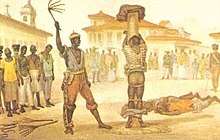Switch (corporal punishment)
| Part of a series on |
| Corporal punishment |
|---|
 |
| By place |
| By implementation |
| By country |
| Court cases |
| Politics |
A switch is a flexible rod which is typically used for corporal punishment, similar to birching.
Punitive switching
Switches are most efficient (i.e., painful and durable) if made of a strong but flexible type of wood, such as hazel (also used for a very severe birch) or hickory. It is indicated that birch and willow branches are time-honored favorites, but branches from most strong trees and large shrubs can be used also. Switches are often nearby from a garden, an orchard or taken from the wild. In the Southeastern United States, fresh-cut, flexible cane (Arundinaria) is commonly used. The usage of switches has been hotly contested in North America and Europe.[1]
Making a switch involves cutting it from the stem and removing twigs or directly attached leaves. For optimal flexibility, it is cut fresh shortly before use, rather than keeping it for re-use over time. Some parents decide to make the cutting of a switch an additional form of punishment for a child, by requiring the disobedient child to cut his/her own switch.
- The tamarind switch (in Creole English tambran switch) is a judicial birch-like instrument for corporal punishment made from three tamarind rods, braided and oiled, used long after independence in the Caribbean Commonwealth island states of Jamaica and Trinidad & Tobago.[2]
- The Gilbertese tribal community at Wagina in Choiseul province (Solomon Islands) reintroduced by referendum in 2005 traditional "whipping" with coconut tree branches for various offences - the national justice system opposes this.[3]
Media references
- In The Dukes of Hazzard episode "The Ghost of General Lee", when Jesse Duke thinks his nephews Bo and Luke faked their deaths, he yells at them "after all you've put me through, I oughtta take the switch to both of you".
- In "Natural Born Kissers", an episode of The Simpsons, Grandpa Simpson (while babysitting Rod and Todd Flanders when he was supposed to babysit Bart and Lisa) says, "There you go with that smart mouth! Lisa, run outside and cut me a switch."
- In the film The Harder They Come, the lead character, after assaulting another character, is punished with "eight strokes of the tamarind switch".[4]
- In the Community episode "Basic Genealogy", Troy's grandmother asks for a switch with which to beat Britta.
- In Spring Awakening, Wendla asks Melchior to hit her with a switch as a way to sympathize for Martha, who is abused by her father.
- In the Don Bluth short film Banjo the Woodpile Cat, Banjo is asked by his father to retrieve a switch.
- In Richard Pryor: Live in Concert, Pryor describes how his grandmother would discipline him by making him retrieve a switch with which she would then beat him.
- In an episode of Kathy Griffin: My Life on the D-List, guest star Paula Deen and Kathy jokingly whack Griffin's tour manager in the back of the legs with a switch. Griffin then quickly turns to hit guest star Michael McDonald in the chest, but accidentally hits Deen in the face.
- In 2014, Minnesota Vikings player Adrian Peterson was indicted for child abuse after hitting his four-year-old son with a switch as a punishment. This left cuts and bruises on the child's back, leg, buttocks, and scrotum.[5]
- The song "Halftime", on the 1994 album Illmatic by New York rapper Nas features the line "my style switches like a faggot". While on the surface, this refers to the notion of a homosexual person changing sexual orientation, it plays on the idea of a switching with the ancient weapon, the faggot.
See also
References
- ↑ Gould, Mark (January 9, 2007). "Sparing the Rod". The Guardian. London: Guardian News and Media. Retrieved February 5, 2009.
- ↑ Parker, Quincy (March 7, 2007). "Human Rights Abuse Concerns". The Bahama Journal. Jones Communications Nassau Bahamas. Retrieved February 5, 2009.
- ↑ "Floggings cut crime: village leader". AAP. The Sydney Morning Herald. March 9, 2006. Retrieved February 5, 2009.
- ↑ McFarlane, Keeble. (April 15, 2006). "Violence is an intrinsic part of the culture". The Jamaica Observer. Jamaica Observer. Archived from the original on March 14, 2009. Retrieved February 5, 2009.
- ↑ Moore, Tina (13 September 2014). "Vikings running back Adrian Peterson faces two years in prison if found guilty of child abuse". New York Daily News. Retrieved 14 September 2014.